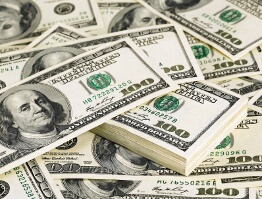The US dollar weakened against the euro on Friday in the wake of a disappointing reading for gross domestic product growth in the fourth quarter of 2017. The greenback failed to find support despite a positive upturn in durable goods orders and a strong overall economic performance in 2017.
The US Bureau of Economic Analysis released a report on economic growth in the fourth quarter of 2017 today. The report revealed that gross domestic product grew by 2.6% in the final quarter of the last year, which compared to 3.2% growth rate in the third quarter of the year. The reading disappointed investors as many expected a 3.0% increase in the gross domestic product in the last quarter.
Today’s data represents the first estimate out of three for gross domestic product growth in the fourth quarter of 2017. The bureau will release its second estimate on February 28, which will include data from additional sources as they become available.
Most of the economic growth in the last quarter appeared to have stemmed from higher consumer spending and stronger investment in the real estate market. Contributions from exports and federal government spending also provided a positive push to the gross domestic product. However, more imports and a downturn in private inventory investment slowed down economic growth in the last quarter.
Gross domestic product increased by 2.3% in 2017 from 2016, which far exceeded its growth from 2015 to 2016 at 1.5%. The big jump in economic growth last year was due to stronger exports, more nonresidential fixed investment, and improving consumer spending.
A separate report from the US Census Bureau showed a positive upturn in orders for durable goods that were manufactured in the United States. New orders for durable goods rose $7.0 billion or 2.9% to $249.4 billion in December 2017 after gaining 1.7% to $242.4 billion in November.
Higher demand for durable goods last month beat estimates of a 0.8% gain and marked the fourth increase in the past five months. Core durable goods, which excludes transportation, rose by 0.6% to exceed expectations of a 0.5% increase.
Most of the unexpected upturn was due to an increase in orders for Transportation equipment, which had a $6.0 billion or 7.4% gain to $87.2 billion. Demand for transportation equipment is volatile and can vary greatly between different months.
EUR/USD traded at 1.2428 as of 13:55 GMT on Friday after touching 1.2487 at 08:05 GMT, the pair’s highest level today. EUR/USD began the day at 1.2392.
The Dollar Index, which tracks the performance of the US currency against its major peers, fell to 89.03 as of 13:56 GMT today from 89.39 yesterday.
If you have any questions, comments or opinions regarding the US Dollar,
feel free to post them using the commentary form below.
